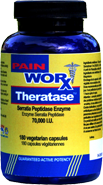|

 |
| Per Capsule Dosage: |
Potency |
| Serrazimes-1 Tm (70,000 I.U. Serratia Peptidase activity) |
117mg |
|
Indication
The most common usage of this product is threefold. As a natural alternative to pharmaceutical anti-inflammatory drugs, to treat conditions of pain and inflammation.
These include osteoarthritis, rheumatoid arthritis, carpal tunnel syndrome, tendonitis, sports injuries and post-operative swellings. Secondarily as a treatment for respiratory tract diseases, including conditions of respiratory congestion, bronchitis, bronchial asthma and sinusitis. Finally it is used for conditions involving arterial plaque build-up including atherosclerosis, phlebitis (vein inflammation) and varicose veins.
Each vegetarian capsule of Theratase contains a specific type of protease called Serratia Peptidase. Proteases are a family of protein digesting enzymes that have a variety of therapeutic applications, aside from serving as a digestive aid. Proteases, derived from animal, plant and microbial sources, are used to fight inflammation, inchronic conditions such as cancer and arthritis, and in acute conditions such as sports injuries, surgery and wounds. The Serratia Protease (Serratia Peptidase) has even broader benefits including digesting non-living tissue, blood clots, cysts, fibrin and arterial plaque. These enzymes also have been used to treat respiratory tract diseases (thins mucus), acute sinusitis and varicose veins (due to breaking down fibrin deposits) (1).
Dosage
Treatment of Inflammation and Pain:
One capsule of Theratase, one to three times daily, one half hour before or one hour after eating, or as directed by a health professional. May be taken with a small amount of food, as long as protein is not present in the meal. Reduce dosage when pain reduces.
Treatment for arterial blockage:
One capsule three times per day on an empty stomach. If digestive disturbances should occur, stay at one capsule per day for the first week, two per day for the next week, three per day on the third week up to 5 capsules per day in divided dosages, for acute need. Take the maximum dosage for 7 days, or until symptoms decrease noticeably, then reduce back to three per day, finally take one per day as a preventative.
Description
SERRAZIMES-1 tm
Serrazimes-1 tm is produced from fungal strains (aspergillus - the variety used to produce most digestive enzymes sold in supplemental form) with a long history of safe use. These strains are very well established, known to be non-pathogenic and do not produce micotoxins. The enzyme Serratia Peptidase is marked under many different names, and is well researched in Europe and Japan. Most studies are based on treating pain and inflammation due to physical trauma, especially post-operative trauma. One German study followed 66 patients after knee surgery. Three days after the surgery the patients who took Serratia Peptidase showed a 50% greater reduction in post-operative swelling than the control group (2). Additional clinical studies cover treating sinusitis, respiratory ailments and breast engorgement, and show that this enzyme also induces anti-edemic activity (prevent fluid retention and swelling).
Logical extension of the anti-inflammatory benefits of this enzyme, have lead to such products being marketed for arthritic conditions. One study out of India confirmed its effectiveness on carpal tunnel syndrome (65% of cases showed significant clinical improvement) (3) and new studies are currently being undertaken to confirm its effectiveness in treating arthritic conditions. As well as reducing inflammation, Serratia Peptidase can block the release of the chemical messengers sent from inflamed tissue that signal pain, and so functions effectively as a pain-blocker.
Enteric Coating?
Much has been made of the necessity of enteric coating protease products when they are to be used to reduce inflammation or clean out cellular debris. If we set aside the marketing hype and look at it from scientific perspective it is fairly clear that the enteric coating is not necessary. Basically, the first function of protease is to digest protein, so if you take these enzymes while there is protein in the stomach that is what they will do. If there is no protein in the stomach, they will serve their secondary functions of cleaning out waste material and reducing inflammation. So when using non-enteric coated products, such as ours, simple take from protein. We suggest they be taken with fruit or carbohydrates, as long as no protein is ingested at the same time (meat, fish, poultry, eggs, cheese, tofu, milk, etc).
Contraindications
All variations of Serratia Peptidase will increase the concentration of antibiotics in teh bloodstream. While this can allow for less antibiotics to be used, if they are properly prescribed together, it can be dangerous to mix the two without professional guidance. Because proteases reduce blood platelet aggregation they should not be combined with blood thinning medications, again unless under the supervision of a trained professional. All protein digesting enzymes can irritate existing ulcers and should be avoided by those with stomach or intestinal ulcers. And, as a general precaution, if you are pregnant or nursing, consult with a professional before using.
References
1. Cichoke, Dr. Anthony J: The Complete Book of Enzyme Therapy. Avery Publishing, Garden City Park, NY, 1999, pp 46,52.
2. Esch PM, Gerngross H, Fabian A. Reduction of postoperative swelling. Fortschr Med. 1989; 197 (4):67-8, 71-2
3. Dept. of Neurology, SMS Medical College and Hospital, Jaipur. A prliminary trial of serratiopeptidase in patients with carpal tunnel syndrome. J AssocPhysicians India, 2000 Nov: 48(11):1130
4. Murray, Dr. Michael T: The Healing Power of Herbs. Prima Publishing, Rocklin, CA, 1995, pp 60,65,67.
5. Kee, W.H., Tan, S.L., Lee, V., Salmon, Y.M., "The treatment of breast engorgement with Serrapeptase (Danzen): a randomized double-blind controlled trial.", Singapore Med J., 1989;Feb 30:48-54.
6. Nakamura, S., et al., "Effect of the proteolytic enzyme serrapeptase in patients with chronic airway disease.", Respirology, 2003 Sep;8(3):316-20.
7. Mazzone, A., et al., "Evaluation of serratia peptidase in acute or chronic inflammation of otorhinolaryngology pathology: a multicentre, double-blind, randomized trial versus placebo.", J Int Med Res, 1990; Sept-Oct 18(5):379-88.

|